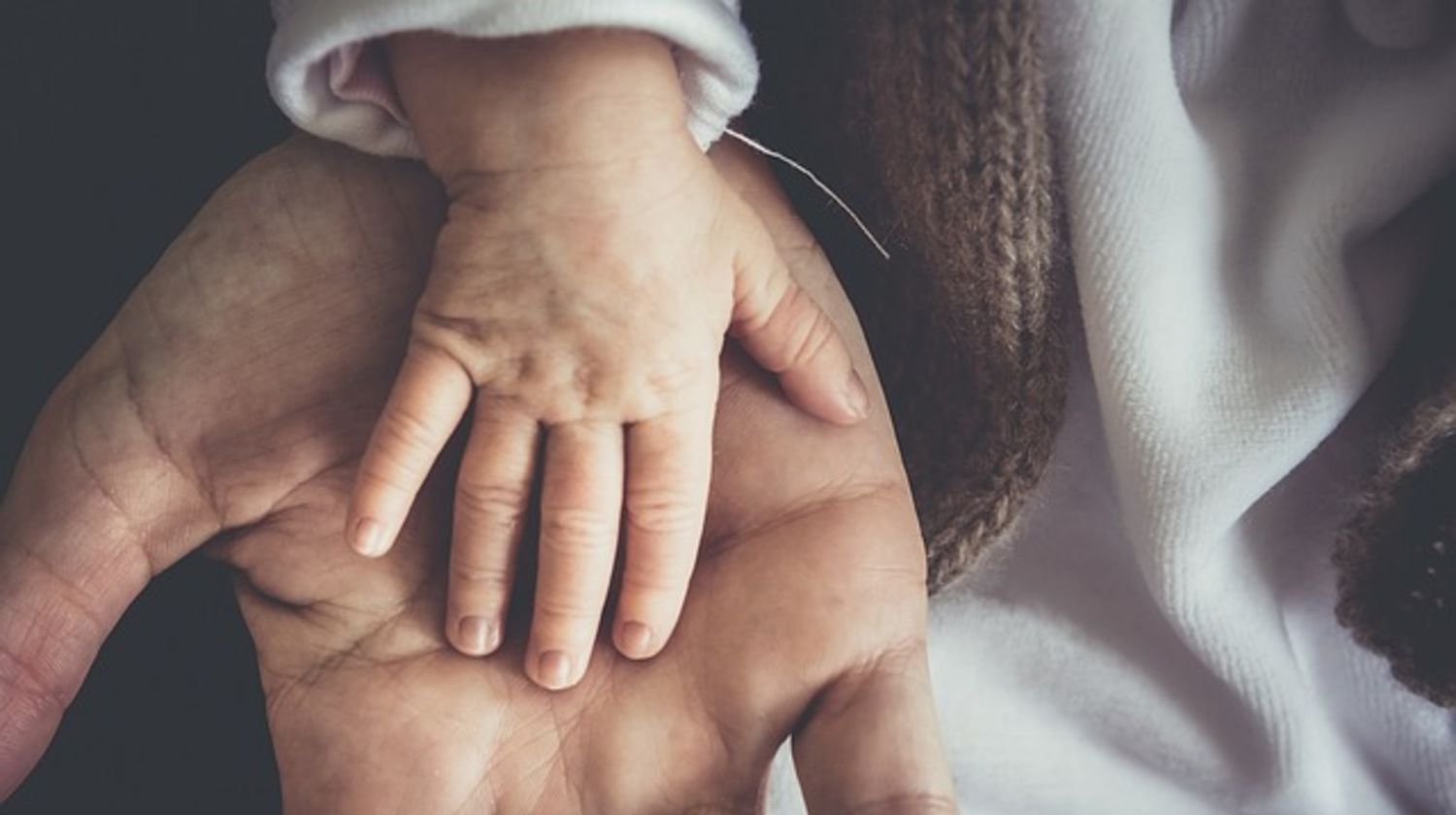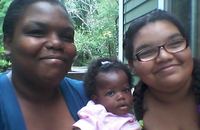News
Baby Debt Diaries: 3 Cautionary Tales of New Parent Sticker Shock

It goes without saying that having a baby is a life-altering experience.
While most of the changes are overwhelmingly happy — like when your little one laughs for the first time — some may be a little tougher to handle.
You transform into a sleep-deprived zombie, spend countless hours changing a never-ending stream of diapers — and have to fork over a pretty big chunk of your paycheck for expenses like child care and baby gear.
While there's not much you can do to prep for the loss of shut-eye or a diaper deluge, you can shore up your savings — because the last thing you want to be thinking about while cradling your newborn is how much those Pampers are setting you back.
So if you're planning to start a family of your own someday, it's smart to start getting your finances in order — pronto.
Just take it from these three moms, who were blindsided by the bundle of money their bundles of joy cost them — and wished they'd read a cautionary tale just like their own before winding up in baby debt.
RELATED: What Would You Give Up … to Be Debt-Free?
“Medical Bills Depleted Our Savings — and Some”
Kathryn Hill, 33, marketing and operations manager for a skin care company, San Antonio, Texas
“Becoming pregnant with my daughter, Phebe, in 2012 came as a surprise.
I was using birth control and didn't have any morning sickness. It wasn't until I started gaining weight in my stomach at the five-month mark that I suspected anything at all.
That left my husband, Rusl, and me with just four months to prep — mentally and financially.
Shortly after learning the big news, we looked at our expenses and identified ways to cut back — like dinners out and shopping trips — in order to pay for our upcoming medical expenses.
We had a high-deductible insurance plan that only covered emergencies — I was 25, single and healthy when I signed up — which meant we'd be on the hook for everything from doctor's appointments to delivery costs.
RELATED: The Skinny on Special Enrollment: 4 Times You Can Revisit Your Health Benefits
Luckily, we were bringing in about $73,000 together — I'm in marketing and my husband's a general contractor — so we easily downgraded our monthly “fun” budget from about $3,000 to $600.
We combined this with our previous savings, and put aside a total of $13,000 before my due date.
Our Baby Sticker Shock As expected, health care costs burned a pretty big hole in our pockets.
Even though I discovered that prepaying for certain services resulted in big discounts — for example, I was only charged $4,000 for what would have been a $10,000 hospital stay — we still managed to blow through the $13,000 before we even brought Phebe home.
What's more, she has chronic sinus and allergy issues. So we had to visit the pediatrician every few weeks at $75 a pop, shell out $133 a month for medication, and pay for special treatments, like a nebulizer — and this was all in addition to her routine checkups and vaccinations.
Add our $475 insurance premium and $700 child care bill to the mix, and we were basically spending every cent of our income each month. As a result, we relied on credit cards for unexpected bills, like car repairs.
We had been debt-free prior to having a baby — but in less than two years, we found ourselves $8,000 in the red.
Crawling Out of Debt When Phebe was about 6 months old, Rusl and I realized we needed to do more than just trim our fun-money budget to get a handle on our finances — although we did that again, too, slashing it from $600 to $300.
We also cut our grocery budget by $300, and used part of that savings to put $50 to $100 a month into an emergency fund, so we could avoid swiping a credit card every time something went wrong. That account was our saving grace when we had to repair the roof and replace our pool pump.
It was such a relief to have that cash to fall back on that it made us regret not tightening our belts sooner, especially considering how unpredictable our medical costs continue to be.
In January our insurance premium rose again from $475 to $525 — without any changes to our benefits. Except this time, we had the extra savings on hand to cover the difference.
Now we have just $2,000 of debt left to pay off. When we're done, we're planning to really kick our savings into high gear — and perhaps even celebrate by taking a (much-deserved!) Mommy-and-Daddy-only vacation.”
RELATED: Emergency Savings 101
“I Didn't Think We Needed to Save on Our Salaries”
Claudia Salinas, 29, SEO manager at a software company, Boynton Beach, Fla.
“I had my first baby, Anthony, in October 2012, and then Nicole less than two years later, in February 2014. Needless to say, it's been a busy few years for my husband, Nelson, and me.
Of course I expected that raising children would be time-consuming–but I didn't foresee the costs.
Before having kids, Nelson and I were doing great, financially speaking. I work as an SEO manager, and he's a technician for a luxury car brand. After paying our bills, we each had $1,500 left over in flexible spending to use however we liked.
So in preparation for my son's birth, I saved only $1,000 to partly cover salary loss during my unpaid maternity leave. We figured our $3,000 monthly cushion would sufficiently cover any baby-related extras.
RELATED: How to Afford Not Working During Maternity Leave
Our Baby Sticker Shock Due to an unresolved insurance mix-up, Nelson and I were instantly sidelined by medical bills in excess of $5,000. My son had jaundice, so we had to pay for daily doctor's visits his first two weeks of life, as well as lab work and specialized medical equipment.
I'd planned to take a 12-week maternity leave — most of which was unpaid — but I returned to work after nine weeks because we just couldn't afford it, thanks to the myriad expenses we'd suddenly added to our monthly budget.
For starters, our monthly family insurance premiums doubled to $350. We also spent $200 on diapers, $60 for formula, $1,400 for child care, $50-$100 for new clothes and toys, and $600 for organic groceries. We also paid just under $4,000 for big-ticket buys, like a crib and a stroller-car seat combo.
Luckily, I was able to work out a payment plan for most of our medical expenses, but these extra costs didn't leave us a lot of wiggle room — and we ended up putting $800 on a credit card.
Crawling Out of Debt The first thing we did to take charge of our finances was create a budget — something we'd never done before. That helped us prioritize the essential expenses and cut out the rest, like shopping and going out.
It also showed us how big a chunk of my paycheck we were spending on child care — 41 percent! We pay my mom to take care of both kids, so we asked her if she'd be willing to take a temporary pay cut to $1,050, which she did. That helped free up some cash to whittle down the medical bills.
Finally, we were able to use our 2014 tax return to polish off the rest.
These days, we avoid getting back into debt by regularly adding to our savings account, which currently sits at $2,500. I only wish I'd adopted this habit before my son was born! Had we been better prepared financially, I would have been less stressed and able to enjoy being a first-time mom more.
Even though we're doing better, we've yet to regain the financial freedom we had before kids. We essentially live paycheck to paycheck, with just enough leftover to eat out once a week.
For now that's good enough — but we certainly don't want to be in this tight of a bind forever. College is expensive, and we need to start saving for that… yesterday!”
RELATED: 4 College Savings Mistakes Even Savvy Parents Make
“I Had to Pick Up a Second Job to Afford New Baby Expenses”

E.A. Hunt, 35, customer service representative for a printing company, Marietta, Ga.
“I have a 15-year-old daughter, Tayla, but my husband and I always knew we wanted to expand our family.
So a few years ago, we started putting money into a “baby fund” — not realizing just how hard the road to pregnancy would be.
We tried several measures to conceive — including fertility drugs — and even explored adoption. It was really tough: Every time a pregnancy test came back negative, we were devastated all over again.
When our second adoption attempt fell through in 2012, we gave up — and, unfortunately, ended up divorcing not long after.
RELATED: Money Mic: How $30K in IVF Treatments Nearly Tanked–and Then Saved–My Finances
I spent the following year doing a lot of emotional healing, including coming to terms with the fact that I couldn't have a baby, and dating new people. So you can imagine my shock when, in 2014, I took a pregnancy test that came back positive.
I'd been told by three different doctors that I couldn't conceive. When I saw a plus sign, I fell to the floor crying. It was a miracle.
After my initial elation, the financial reality of my situation struck me. Four months prior I'd accepted a customer service job through a temp agency, which meant I didn't get paid maternity leave or vacation time because I wasn't full-time.
I also knew I couldn't expect the baby's father to help out. We'd just ended a brief relationship, and requested that his parental rights be severed.
I immediately put myself on a strict budget, cutting corners wherever I could, like opting to eat at home and lumping errands together to save on gas.
Thankfully, my boss was really happy for me and understanding of my situation. He hired me as a permanent employee, and scheduled me to work overtime. Altogether, I was able to set aside $1,500 in five months.
My Baby Sticker Shock Because I had high blood pressure, I was on bed rest a couple of times during my pregnancy and had to miss work.
My daughter, Ava Elease, was born in November 2014 via C-section, and I had to be off my feet for six weeks — a lengthier unpaid work absence than I'd planned for. Because of this, the $1,500 I'd saved only lasted a few weeks after her birth.
My new baby expenses added up to over $1,500 a month: I spent $250 on formula, $720 on diapers, and $550 on day care. I also bought about $300 worth of essential baby gear, like a stroller, crib, and bassinet.
I was stunned by how prices had soared since my first kid. Diapers cost half as much back then! I realized I should have doubled what I'd saved — at the least. I ended up accepting some money from my parents to get by, but also racked up $2,000 of credit card debt in just six weeks.
Crawling Out of Debt As soon as I realized the dangerous road I was headed down, I picked up a second job to avoid falling deeper into debt. I worked nights and weekends, and used every paycheck to cover baby expenses and my credit card bill.
Five months later I was back in the black.
In hindsight I have only one regret: I wish I'd found a second job earlier — while I was pregnant — so that I never had to use my credit card in the first place.
Even though I'm now debt-free, I still work both jobs in order to build up my emergency fund. I'm determined to never get caught off guard again.”
RELATED: 5 Money Mistakes Even Good Savers May Make
This post originally appeared on LearnVest.
More From LearnVest
Infographic: 5 Money To-Dos Every New Parent Should Do
The Big Debate: Should You Go Back to Work After Baby?
Checklist: I Want to Financially Prepare for a New Baby
LearnVest is a program for your money. Read our stories, use our tools and talk to a Planner about getting a financial plan designed for you.
LearnVest Planning Services is a registered investment adviser and subsidiary of LearnVest, Inc., that provides financial plans for its clients. Information shown is for illustrative purposes only and is not intended as investment, legal or tax planning advice. Please consult a financial adviser, attorney or tax specialist for advice specific to your financial situation. Unless specifically identified as such, the individuals interviewed or quoted in this piece are neither clients, employees nor affiliates of LearnVest Planning Services, and the views expressed are their own. LearnVest Planning Services and any third parties listed, linked to or otherwise appearing in this message are separate and unaffiliated and are not responsible for each other's products, services or policies.




